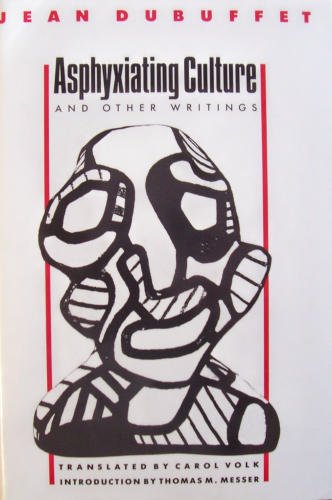Jean Dubuffet: Asphyxiating Culture (1968–) [FR, PT, CZ]
Filed under book | Tags: · art, critique, culture, outsider art, philosophy of art

“Jean Dubuffet’s only and a particularly significant book, Asphyxiating Culture is a philosophical and political discussion which elucidates his antagonistic stance towards culture and its influence on the public domain of art and the private domain of creativity.
In his anti-culturalism, he posited the realm of culture against that of the individual, and saw culture as equivalent to the state and the police. To him, it represented bureaucracy, propaganda, patriotism, indoctrination, capitalism, the status quo, and illusory coherence. The individual, however, was the keeper of the creative spirit and the domain of the common man. The individual exemplified rebellion, independence, creativity, nature, diversity, and eclecticism.” (source)
French edition
Publisher Jean-Jacques Pauvert, Paris, 1968
Expanded edition published by Les éditions de Minuit, Paris, 1986, 124 pages
MA thesis on Dubuffet (Samantha Krukowski, 1992)
Dubuffet’s sound recordings (UbuWeb)
Asphyxiante culture (French, expanded ed., 1968/1986, added on 2014-2-2)
Cultura asfixiante (Portuguese, trans. Serafim Ferreira, 1971, no OCR)
Asphyxiating Culture and Other Writings (English sample, trans. Carol Volk, 1988, pages 7-12)
Dusivá kultura (Czech, trans. Ladislav Šerý, 1998, no OCR)
Michel Henry: Barbarism (1987/2012)
Filed under book | Tags: · art, capitalism, critique, critique of science, critique of technology, culture, education, philosophy, philosophy of science, science, technology

Barbarism represents a critique, from the perspective of Michel Henry’s unique philosophy of life, of the increasing potential of science and technology to destroy the roots of culture and the value of the individual human being. For Henry, barbarism is the result of a devaluation of human life and culture that can be traced back to the spread of quantification, the scientific method and technology over all aspects of modern life. The book develops a compelling critique of capitalism, technology and education and provides a powerful insight into the political implications of Henry’s work. It also opens up a new dialogue with other influential cultural critics, such as Marx, Husserl, and Heidegger.
First published in French in 1987, Barbarism aroused great interest as well as virulent criticism. Today the book reveals what for Henry is a cruel reality: the tragic feeling of powerlessness experienced by the cultured person. Above all he argues for the importance of returning to philosophy in order to analyse the root causes of barbarism in our world.
Originally published in French as La Barbarie by Editions Grasset & Fasquelle, 1987
Translated by Scott Davidson
Publisher Continuum, London/New York, 2012
Volume 95 of Continuum Impacts
ISBN 1441132651, 9781441132659
168 pages
wikipedia
publisher
google books
PDF
PDF (Alt link, added on 2014-1-21)
Continent. journal, No. 1-7 (2011-2012)
Filed under journal | Tags: · art, culture, film, media studies, philosophy, poetry, politics, sound recording, theory
Continent. maps a topology of unstable confluences and ranges across new thinking, traversing interstices and alternate directions in culture, theory, politics and art.
Continent. exists as a platform for thinking through media. text, image, video, sound and new forms of publishing online are presented as reflections on and challenges to contemporary conditions in politics, media studies, art, film and philosophical thought.
Contributors to issue 2.3: François Laruelle, Andy Weir, Henrik Lübker, Berit Soli-Holt & April Vannini & Jeremy Fernando, Andrea Fraser, Sean Gurd, Paul Amitai, Sasha Ross, Thierry Geoffroy.
Contributors to issue 2.2: Vilém Flusser, Bonnie Jones, Eugene Thacker, Gary J. Shipley and Nicola Masciandaro, Vincent W.J. van Gerven Oei, Sean Joseph Patrick Carney, The Editors of Speculations & continent., Ishac Bertran, Duane Rousselle, A. Staley Groves.
Editors: Jamie Allen, Paul Boshears, Nico Jenkins
Creative Commons Attribution 3.0 License
ISSN 2159-9920
Download issue 2.3 (single PDF)
Download issue 2.2 (single PDF)
View issue 2.3 (HTML and PDF articles)
View issue 2.2 (HTML and PDF articles)
View back issues (HTML and PDF articles)

